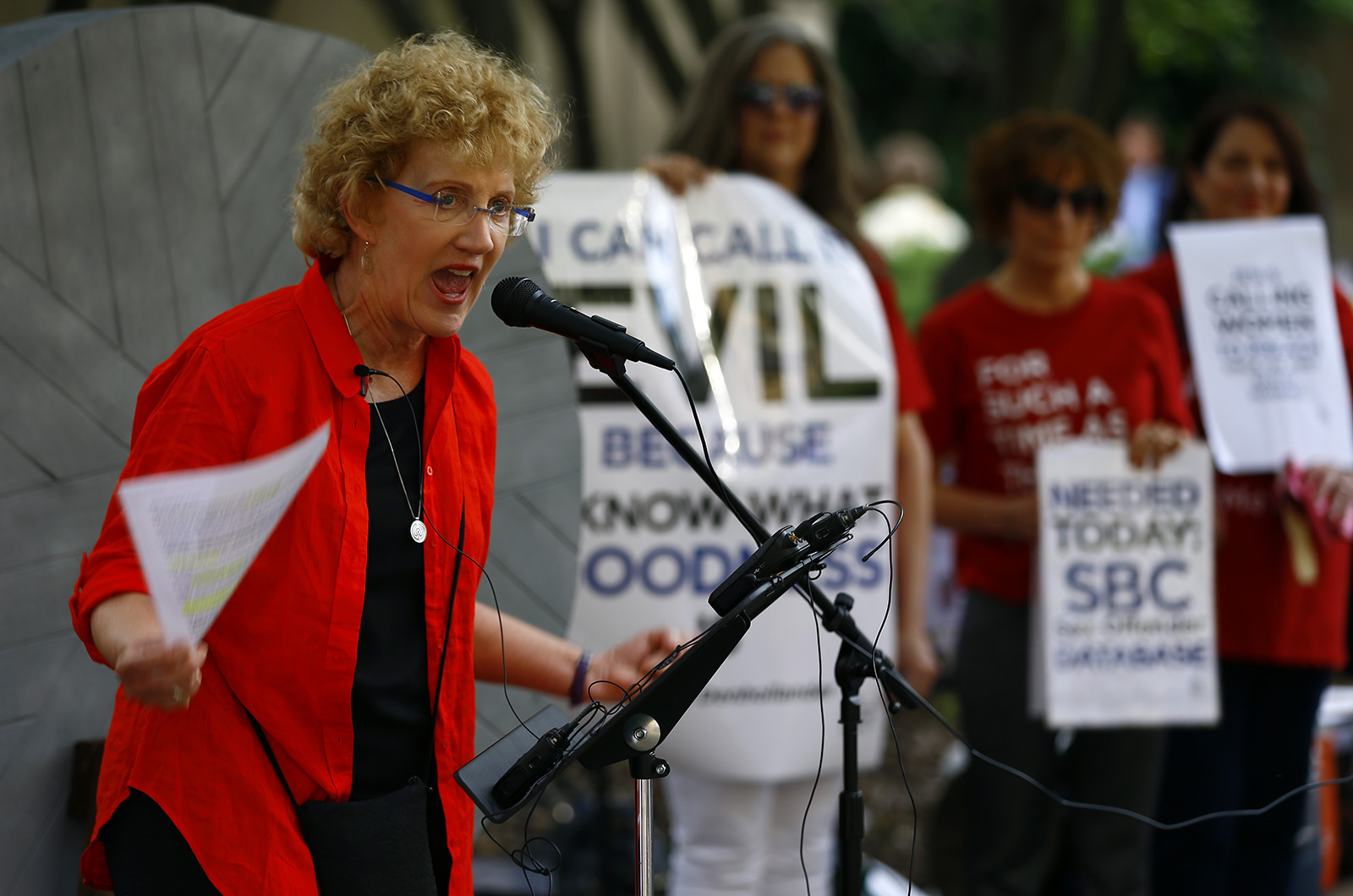Brown sees the lack of progress on reforms as part of a larger pattern in the SBC. While church messengers and volunteers like those on the ARITF want reform and work hard to address the issue of reforms, there’s no help from SBC leaders or institutions. Instead, she said, SBC leaders do just enough to make it look like they care, without any real progress.
Christa Brown talks about her abuse at a rally outside the annual meeting of the Southern Baptist Convention at the Birmingham-Jefferson Convention Complex on June 11, 2019, in Birmingham, Ala. (RNS photo/Butch Dill)
“The institution does not care,” she said. “If it did care it would put money and resources behind this. And it did not do that. And it hasn’t for years.”
SBC leaders have long sought to shield the denomination and especially the hundreds of millions of dollars given to Southern Baptist mission boards and other entities from liability for sexual abuse. The 12.9 million-member denomination has no direct oversight of its churches or entities, which are governed by trustees, making it a billion-dollar institution that, for all intents and purposes, does not exist outside of a few days in June when the SBC annual meeting is in session.
As a result, abuse reform has been left in the hands of volunteers such as those on the task force, who lacked the authority or the resources to complete their task.
As part of its report, the ARITF recommends asking local church representatives, known as messengers, at the SBC annual meeting if they still support abuse reforms such as the Ministry Check database. The task force also recommends that the SBC Executive Committee be assigned the job of figuring out how to implement those reforms — and that messengers authorize funding to get the job done.
Church messengers will have a chance to vote on those recommendations during the SBC annual meeting, scheduled for June 11-12 in Indianapolis.
The task force’s report does include at least one success. During the annual meeting next week, messengers will receive copies of new training materials, known as “The Essentials,” designed to help them prevent and respond to abuse.
This is the second time in the past 16 years that attempts to create a database of abusive Southern Baptist pastors failed. In 2007, angered at news reports of abusive pastors in their midst and worried their leaders were doing nothing about it, Southern Baptists asked their leaders to look into creating a database of abusive pastors to make sure no abuser could strike twice.

Messengers vote during the first day of the Southern Baptist Convention annual meeting at the Ernest N. Morial Convention Center in New Orleans on June 13, 2023. (RNS photo/Emily Kask)
A year later, during an annual meeting in Indianapolis, SBC leaders said no. Such a list was deemed “impossible.” Instead, while denouncing abuse and saying churches should not tolerate it, they said Baptists should rely on national sex offender registries.
Because there is no denominational list of abusive pastors, local church members have to fend for themselves when responding to abuse, said Dominique and Megan Benninger, former Southern Baptists who run Baptistaccountability.org, a website that links to news stories about Baptist abusers.
The couple started the website after the former pastor at their SBC church in Pennsylvania was ousted when the congregation learned of his prior sexual abuse conviction. Before long, he was preaching at another church.
“We were just, like, how does this happen?” Megan Benninger said.
When the couple posted on Facebook about their former pastor, leaders of their home church reprimanded them, telling them in an email that they should not have made their concerns public. Not long afterward, the couple decided to set up a website that would collect publicly available information about abusive pastors.
“Our goal is to share information so people can decide whether a church is safe or not,” said Dominique Benninger.
To set up their site, the Benningers modified an e-commerce website design so that instead of sharing information about products, it shares information about abusive pastors. The website became a database of third-party information, which is protected by the same federal laws that protect other interactive computer services, like Facebook.


